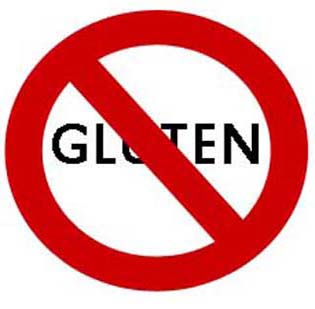When I first began reading this article. My first thought was, “Not another thing associated with celiac and gluten!” As I read further, I began to see to possible connection with more than celiac disease, but with any type of gluten sensitivity or gluten intolerance. This article covers a study which shows actual brain damage in those with celiac disease and the common and more serious celiac disease neurological symptoms, including brain damage. Read on to learn from Dr. Vikki Petersen. Continue reading “Celiac Disease Neurological Symptoms – Is Gluten Damaging Your Brain”
I’m Celiac – How Good Can I Expect to Feel?

Discovering that you have celiac disease, or gluten sensitivity, is often a decade long process (or longer!) that entails many doctors, many drugs to treat symptoms actually being caused by gluten, and a lot of treatments that don’t work.
When you finally find out the ‘real’ answer – gluten – you think all your problems will be solved. And initially, it often seems that they are. But, due to a continued leaky gut, undiagnosed infections, a compromised immune system, cross-reactive foods (those that mimic gluten), poor digestive enzyme levels, probiotic imbalances and/or hormone imbalance, symptoms often return. Continue reading “I’m Celiac – How Good Can I Expect to Feel?”
FDA Seeks Input on Gluten in Drugs to Protect Celiac Disease Patients
In 2011, the FDA opened a docket for discussing gluten-free food labeling to help those wth celiac disease and high gluten intolerance. This year’s subject open for discussion is gluten in drugs. The products in question include prescription, nonprescription, biologic, and homeopathic drugs. Learn about the FDA’s assessment results on the percentage of gluten tolerated by those with celiac disease and what they are seeking in regards to comments on gluten in medication and from whom. Continue reading “FDA Seeks Input on Gluten in Drugs to Protect Celiac Disease Patients”
Undiagnosed Celiac? Your Bones are at Risk
Dr. Vikki Petersen stresses the importance of an undiagnosed celiac getting diagnosed; how gluten effects their bone health; explains evidence of same; and reminds us to never cheat on our gluten diet. Thank you once again, Dr. Vikki, for educating us all!
 For those of us who know something about celiac disease we understand that:
For those of us who know something about celiac disease we understand that:
It’s an autoimmune disease
We may or may not know the following however:
Where there’s one autoimmune disease there tends to be others
Autoimmune diseases are the third leading cause of death in this country Continue reading “Undiagnosed Celiac? Your Bones are at Risk”
Supervalu Rolls Out Gluten-Free Health and Wellness Program
SuperValu, drug and supermarket retailer, will be rolling out their new health and wellness program which addresses the gluten-free diet for those who have celiac disease, gluten intolerance, gluten sensitivity, as well as other diseases and conditions. Their supermarkets rolling out the program will include Acme, Albertsons, Cub Foods, Farm Fresh, Hornbacher’s, Jewel-Osco, Shaw’s/Star Market and Shoppers Food & Pharmacy. Lucky, Shop-n-Save, and Save-A-Lot were not mentioned. Continue reading “Supervalu Rolls Out Gluten-Free Health and Wellness Program”
Gluten Intolerance and Stress

Gluten intolerance, be it celiac disease or gluten sensitivity, creates a lot of stress on the body. Through malabsorption, inflammation and a host of other damaging factors, it is no wonder that the stress gland itself would be similarly affected.
The stress glands are designed to help us adapt successfully to life’s stressors and do so in many ways.
Do you find yourself in a situation where you need to move quickly? This gland will increase your heart rate and bring more blood to your muscles with the result of making you faster and stronger. Continue reading “Gluten Intolerance and Stress”
Gluten-free Grain-free Baking
I hear more and more stories from individuals who are on a gluten-free diet and/or have celiac disease, who cannot tolerate any grains whatsoever, not just gluten grains (wheat, rye, barley and contaminated oats). They go gluten-free and grain-free! Some individuals do not fully recover on a gluten-free diet alone because they have other allergies or intolerances. Other grains contain a different type of gluten. Some are sensitive to all forms of gluten. Continue reading “Gluten-free Grain-free Baking”
Is Gluten Sensitivity Real?
Gluten-sensitivity (GS) is a very controversial subject, but new research has been performed which will answer this very question. Before I explore whether or not gluten-sensitivity is real, I would first like to explore “gluten-sensitivity,” itself, as well as “gluten-intolerance” and “celiac disease” in order to provide a better understanding of the research. Continue reading “Is Gluten Sensitivity Real?”
National Celiac Disease Awareness Month
May is celiac disease awareness month (not to be confused with International Celiac Awareness month in October). I not only wish to raise awareness about celiac disease, but those who have a gluten intolerance for other reasons! Continue reading “National Celiac Disease Awareness Month”
Celiac Disease and Probiotics
By: Carla Spacher
Once antibodies were discovered as a way of testing for celiac disease, it opened up an entirely new way of assessing the data found in celiac disease research. Dr. Alessio Fasano, Medical Director for University of Maryland School of Medicine (update 2015 – now at the Massachusetts General Hospital), reported that, previously, doctors had to diagnose celiac disease based upon the patient’s symptoms; biopsy of the gut to confirm inflammation; and whether a gluten-free diet provided any relief. However, as is with any autoimmune disease, Dr. Fasano warns that just screening for antibodies against gluten is not a definitive diagnosis because anyone can carry this antibody who does not necessarily have celiac disease. Celiac Disease research continues and we are learning new things every day. Learn more about celiac disease, ongoing research and about the roles of probotics and the appendix. Continue reading “Celiac Disease and Probiotics”








